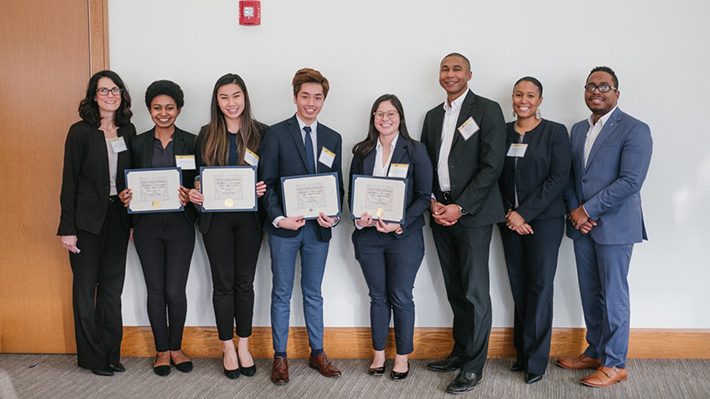Columbia MBA Students Discuss Leadership and Impact in the Nonprofit Sector

If you’re looking for professional development opportunities and ways to make an impact, serving on a nonprofit board might be the perfect outlet. At least that’s what many Columbia Business School students are discovering. The latest trend at CBS is joining a junior board of directors for nonprofit governance.
What is a Nonprofit Junior Board?
“Sometimes called associate boards or leadership councils, these assemblies of young business leaders—typically under 35 years of age—bolster their organizations through mission-critical initiatives such as fundraising and public outreach,” explains CBS news.
These boards are an opportunity for MBA students to explore the nonprofit sector while also gaining essential business development skills. Students walk away with training in the mechanics of managing a nonprofit.
According to the CBS Tamer Center for Social Enterprise, it’s a great way to give back to the community while also enhancing a student’s resume. Serving on a board offers opportunities for networking, working abroad, and more. According to a panel discussion, “members can expect to get much more out of the experience than the time and resources they are expected to give.”

From networking to grassroots organizing, sitting on a junior board of a nonprofit gives Columbia Business School students a unique opportunity to build a helpful future.
Junior Boards and Nonprofit Governance
At CBS, junior boards have become a staple in the nonprofit community. It’s a way for organizations to gain fresh ideas from young talent. For example, Lindy Gould (MBA ’19) built a junior board from the ground up for the Clinton Foundation during her spring internship. But that’s just one example.
There are many board opportunities and board matching services to help students find their perfect fit. The CariClub lists more than 1,000 boards on its platform, and the annual Nonprofit Board Showcase at CBS provides a unique opportunity for students and alumni to meet representatives from nonprofit organizations.
As for getting on a junior board, it varies depending on the organization. Some require a formal process, which means lots of networking. Others are open to the idea as long as you are passionate about the organization and are willing to reach out.
Sitting on a Junior Board
Most often, junior boards have no fiduciary responsibilities. Instead, these boards are typically focused on fundraising goals either through soliciting donations or the members donating themselves. The average commitment is around $1,000, but most members raise even more.
Outside of raising funds, membership on a board provides an excellent platform for students to demonstrate what they care about and to make a difference. You can learn more on the Columbia Business School website.
This article has been edited and republished with permissions from its original source, Clear Admit.
Inside NYU Stern’s New MS in Quantitative Management

Getting into business from a non-business background always presents a significant learning curve. And while most MBA programs can help candidates no matter the experience, it can still leave you feeling behind.
Luckily, that may not be the case for NYU Stern’s newly launched online Master of Science in Quantitative Management (MSQM) program. Explicitly designed for non-business majors, it helps students grow business fundamentals and analytics, all from the comfort of home. It’s officially marked as the “first and only top-ranked U.S. business school to deliver an MS in Management online,” according to a recent press release. Continue reading…
The Muddled World of Leadership Cliches, and More – Philadelphia News

As November draws to a close, let’s take a look at some of the biggest business school stories coming out of Philadelphia business schools this week.
Three Big Leadership Clichés – and How to Rethink Them – LinkedIn
Geoffrey Garrett, Dean of The Wharton School and official LinkedIn “Influencer,” recently took to the social media site to talk about the gamut of leadership cliches that dominate the conversation around those roles.
In a conversation with a group of upper-level executives at the Wharton CEO Academy in New York, Garrett pivoted away from the following three cliches, turning them into something more modern, useful, and promising:
1.) Stick to your guns
2.) Question everything
3.) It’s a marathon, not a sprint
On sticking to one’s guns, Garrett emphasizes certain elements of 1980s corporate and political culture that found esteeming value when a leader does not waver on their principles. “Sticking to your guns is valued because it signals strength, courage and commitment under adversity, which is why we so often think about war heroes in this way,” he says.
He notes, however, that there is value in knowing when to “fold ’em” with a key Kenny Rogers reference in tow. “There is no simple score sheet to tell you when the positives from sticking to your guns become outweighed by the negatives. But the world is littered with examples where leaders wait too long to make the switch. Think General Lee’s historic defeat at Gettysburg in the American Civil War, Jeff Immelt at GE or John Chambers at Cisco,” Garrett continues.
“Most leaders will change course eventually because there is not much valor in heroic defeats. But the best leaders will change course long before the writing is on the wall. Compare the demise of Kodak with the transformation of IBM. But how do you know when the writing is on the wall? The answer is judgment, arguably the most valuable trait in a leader. It’s easy to recognize in hindsight, because good leaders make good decisions—the definition of good judgment.”
To see the rest of Garrett’s advice on leadership cliches, head over to LinkedIn.
Drexel Students Win Second Annual Diversity Case Competition – Drexel LeBow News
Students from the Drexel University LeBow College of Business brought home a brand new title as winners of the second annual Diversity and Inclusion Business Case Competition.
Drexel LeBow defeated 11 other local challenging universities in a competition with a goal to “help create a diversity training protocol for Home Away From Home, a global hotel chain,” according to the business school.

Winners from the LeBow College of Business at the second annual Diversity and Inclusion Business Case Competition / Photo via lebow.drexel.edu
The LeBow team of “Johnny Zhu, Kimberly Gain, Stephanie Arredondo, and Rachael Wright” nabbed first place with their curiously-titled “Raising Our One Family (ROOF)” strategy. Zhu explains, “ROOF stands for the overall company-wide training, which is rolled out in the form of top-down management and tailored to individual locations, corporate level, and field level. This proposal is not a mold, but a 360-integrated training approach where as a family, employees are living out the mindset of diversity and inclusion, not only to guests but to each other as well.”
To learn more about the Drexel LeBow team and the case competition, click here.
The Bizarre Bias That Affects How You Shop – BBC
The work of Beth Vallen, a researcher at the Villanova School of Business, was recently highlighted by author Martha Henriques in the BBC regarding just how pervasive “anti-fat” bias can be.
Henriques notes that overweight people tend to statistically suffer when it comes to things like job offerings, and even get less eye-contact than people of average weight and size. It is perhaps not so surprising to find that business models are often altered for overweight people.
In “Shape and Trait‐Congruency: Using Appearance‐based Cues as a Basis for Product Recommendations,” a new study authored by Vallen and colleagues Karthik Sridhar, Dan Rubin, Veronika Ilyuk, Lauren G. Block, and Jennifer J. Argo—published in the Journal of Consumer Psychology—found that overweight customers were offered more products that resembled their body types, even if the products, such as bottles of perfume, were not wearable.
Speaking with Henriques, Vallen says, “Our thinking was these subtle prejudices that lead to these effects are based on something more than superficial shape-matching.”
“We wanted to show that this was a bias that reflects the thoughts and decisions processes of all people, not just sales people.”
To read more about the study, head over to the BBC website and the Journal of Consumer Psychology.
New Northwestern Career Video Series Tells You How to Own Your Career

The Career Management Center (CMC) at Northwestern University’s Kellogg School of Management recently launched the “Own Your Own Career” video series aimed to develop brave leaders.
The series was created for prospective and current students, along with alumni, to discuss aspects of managing a career throughout its life cycle. The videos also touch on how Kellogg students can bring value to employers and demonstrate the qualities they seek.
The goal of the video series is not only to help students launch their careers, but also to help them gain the skills and mindset they need to manage their careers over a lifetime, explains Liza Kirkpatrick, senior director of the CMC for the full-time MBA program at Kellogg.

Kellogg Senior Director of Career Management Liza Kirkpatrick
“To that end, we enlisted some of the best minds at Kellogg to address topics that are foundational to owning your career—developing your network, career agility, resiliency, selling your career, and leadership.”
Kirkpatrick continues, “These quick videos tell a narrative about career management that will resonate with and be informative to a broad array of audiences, including prospective and current students.”
The first four episodes of the “Own Your Own Career” series are already online.
- Episode 1: Starting the Career Journey—The first episode highlights three different individuals: Liza Kirkpatrick, Adnan Rukieh, director of the CMC for the executive MBA and evening & weekend MBA; and Matthew Temple, director of the CMC for alumni career and professional development. Together they discuss how individuals can start their career right now.
- Episode 2: Professor Harry Kraemer on Networking—The second episode delves into the importance of networking, emphasizing the value of helping others so they might return the favor in the future. Kraemer talks about networking as a lifelong journey and a key to reaching the C-suite.
- Episode 3: Associate Dean and Professor Bernie Banks on Leadership—This third episode discusses what it takes to be an influential leader who inspires people to perform. Banks dives deep into the situational nature of leadership and how to get people to fulfill your expectations.
- Episode 4: Professor Carter Cast on Career Agility—In episode four, Cast talks about being self-reflective during a career transition. He encourages viewers to understand their strengths and weaknesses and to think several steps ahead when it comes to their career.
“The video series enhances and expands the CMC’s foundational work by highlighting faculty and industry thought leaders who can provide practical examples based on their experience of how to actively manage or own one’s career,” Kirkpatrick says.
“The series provides a roadmap for being proactive and present in your own career development and encourages students to continue asking the right questions to shape their career, not only while looking for a job, but throughout their entire career life cycle.”
This article has been edited and republished with permissions from our sister site, Clear Admit.
Learning from MIT Sloan’s First All-Female Senate Leadership Team

Women in leadership positions are still relatively rare. According to the latest report from MSCI, a research and analytics firm that helps leading investors build and manage portfolios, it could likely be 2027 before women fill just 30 percent of directorships in publicly held companies. Currently, they only hold 18.1 percent of such posts. But despite these discouragingly low numbers, significant progress is being made in other arenas. Recognizing and encouraging progress toward greater gender equity in business and in business school is extremely important if we want to help foster even more.
Fortunately, we need look no further than MIT Sloan School of Management to find clear signs of progress. During its most recent Senate election, two women were named co-presidents, marking the first time in the school’s history that its student government can claim an all-female top leadership team.
Avery Beach and Jennifer Zheng ran for co-presidents as a way to give back to MIT Sloan, a program that they said “has changed our lives.” They went on to explain, “Each of us felt strongly about the school’s potential and thought we could contribute to making it even better. We also believe that representation is extremely important. By running for co-president, we hope that we’ve inspired others, including underrepresented voices, to take on future leadership roles and continue Sloan’s mission to improve the world.”
Both women feel that it has been an extremely valuable opportunity to serve as the school’s first all-female Senate leadership team. In these roles, they have had a chance not only to develop their leadership skill set, but also to expand their network and impact their community.
“Our role as student leaders involves understanding how to influence key stakeholders, managing an organization of 60 students, and making frequent public speaking appearances,” explained Beach and Zheng. “We have learned and grown through this experience in an environment where it is okay to make mistakes. These failures and successes have made us better leaders, and this experience will translate into our work after school.”

Avery Beach and Jennifer Zheng
Serving as co-presidents of the Sloan Senate has been important to both women personally, but the experience has also convinced Beach and Zheng that it its important for other women, particularly female MBA students, to take on leadership roles within their programs and schools.
“Women are often underrepresented at the top of the career ladder,” they said. “By leading early and regularly, women can stand out in the current job market as well as in their future careers, such as during promotions. We hope that women continue to strive for these experiences.”
In the end, Beach and Zheng have felt empowered by their positions as Senate leaders and hope other women will feel the same. “As we look to the legacy we’ve left at the school, we hope to be remembered not only as effective female leaders, but as effective leaders—that is what will make a difference,” they said.
This article has been edited and republished with permissions from our sister site, Clear Admit.
How To Avoid Costly MBA Résumé Mistakes

Submitting a résumé is perhaps the most crucial part of every prospective MBA’s application process. A good résumé provides insight into who an applicant is, and what they’ve accomplished. A well-crafted, attention-grabbing résumé that captivates an admissions team can bring an applicant much closer to an acceptance letter.
But aside from a name, contact info, and educational and professional details, what should a slam-dunk MBA resume include?
What Are The Résumé Basics?
Starting with the principle basics, résumés should be short, sweet, and concise. Ideally, they should fit on one page—maybe two. Stephan Kolodiy, an admissions officer at Rutgers University, told U.S. News & World Report that long résumés are a common issue with many MBA applicants.
“Sometime we get a résumé that’s five to six pages long, and that’s way too much information,” he says.
That one-to-two pages of concise information should also be 100 percent accurate—one should never lie on a résumé. Because credibility plays a big role in the application process (MBA or otherwise), it is unwise to fabricate work or school experience. Deceitful, even exaggerated, résumés are always rejected by business schools, and admitted students who submit compromised résumés are at risk for expulsion. This is serious stuff, so don’t lie!
Carrie Marcinkevage, MBA Managing Director at the Smeal College of Business at Penn State University, told U.S. News that honesty is always the best policy.
“Authenticity allows you to find the right school and that school to find you,” Marcinkevage says. “Allow them the chance to find the real you.”
Perhaps most importantly, all MBA résumés should provide examples of success. Prospective MBAs should give admissions officers a reason to send an acceptance letter by showing concrete examples of career advancement, or of how an MBA candidate achieved results for a particular client.
“When applying to a top-tier business school, you’ll need to show admissions committee on a clear path of professional growth,” U.S. News reports.
What Are You Forgetting?
There are also some not-so-basic guidelines that MBAs are encouraged to follow when crafting a solid résumé. Investopedia published a guide reviewing some of the best resumes for MBA applicants that outlines a few tips that many prospective business students may not have previously thought of.
Without sounding like too much of a graphic design nerd, it’s important to take typeface into account with a résumé. Yes, fonts matter. It’s best practice to rely on on two typefaces: A bold sans-serif face for headers, and a standard serif face for body type. For those of you who don’t know, a serif is the tiny extension on the termination point of an individual letter, the little “hat” at the end of a letter if you will.
Serifs exist to make smaller text easier to read, so they are the best friend of admissions offices who may read hundreds of résumés per day. Sans-serif fonts—letters that don’t include serifs—are cleaner and pop easier when bolded out. Résumés should avoid using fonts that are too common, such as Times New Roman, but also avoid ridiculous fonts like Comic Sans. Nobody likes Comic Sans.
Aside from listing relevant work experience, and showing how much growth took place at each job, there are other skills that every résumé should highlight. According to U.S. News, the three skills that can best help sell an MBA applicants résumé to a business school are:
-
- Leadership
- Communication
- Innovation
First and foremost, business schools want to see strong leadership skills as well as personal growth. All MBA programs focus on developing management skills, but schools wants to know that a solid foundation of leadership is already there. Good résumés provide evidence of an applicant motivating a team behind a common goal, figuring out the best use of other’s talents and skills, instilling a concrete vision, and prioritizing the needs of an organization above personal needs.
As for communication, a résumé is an applicant’s first line of communication to a business school, and should be chock-full of structured writing and thought-out word choice. U.S. News shows the different between a boring resume and beautifully worded one:
“Here’s a real example of a blah bullet point in a client’s first draft: ‘Helped with new software implementation.’
Now, a brilliant bullet point: ”Spearheaded software upgrade in the San Francisco field office by coordinating with software developer, leading training sessions, and facilitating implementation schedule.’ The second example offers a much more comprehensive understanding of the scope of the accomplishment.”
Some applicants may try to hard to impress admissions officers with technical jargon or fancy terminology. Lose it, and show that you can clearly, and simply explain headier topics in writing:
“One client listed this bullet point on his resume: ‘Created VA1 Business Acquisition.’
Once we translated that into something the MBA admissions audience would understand, the résumé said: ‘Devised and launched outbound communications plan for our premier voice activated product. Product was well received and became cash flow positive within 14 months.’
Much better.”
Lastly, a résumé that shows an applicant has helped innovate will go a long way. This piece of advice is especially handy for applicants with traditional pre-MBA jobs. All admissions officers know what a consultant or analyst is tasked with at an entry-level position. A resume is an opportunity to shed light on things that sets an applicant apart from other typical analysts. Things to keep in mind include: training a newly hired analyst, leading college recruiting efforts, or organizing an office volunteering or fundraising initiative.
Avoiding Deceptive Mistakes
Now, here’s where we can get a little dramatic: Résumés are the first impressions a prospective MBA job candidates has with a potential employer. Since no one gets a second chance to make that first impression, don’t mess it up!
Bloomberg issued a list of the “Ten Biggest Resume Blunders” that outlines exactly what not to do with an application résumé, which includes obvious items like avoid writing a bad cover letter and remove foolish typos and inconsistencies.
The list also features some gems, like how to avoid making your résumé a cluttered mess. Again, not to sound like a graphic design professor, but the look of a résumé certainly counts. Avoid using fancy graphics or designs, and provide a crisp, clean document that’s easy to read on a computer screen.
“The résumé should be presentable, not an information dump,” Chris Thomas, Global Recruiting Director of the Experienced Commercial Leadership Program at General Electric, told Bloomberg. “There should be some white space.”
A well-done résumé shouldn’t misfire on any points—bullet points, that is. Some schools offer formats for resumes, specifically on how to list past job experience. Schools like the University of Michigan Ross School of Business advise students to use the “Action Context Result” format, which describes an action they performed, where they performed it, and the results it garnered.
“‘Worked for XYZ Corp., 2008 to 2012’ says close to nothing,” Damian Zikakis, Director of Career Services at Ross, told Bloomberg. “’Led a review of supplier contracts for the technology division resulting in savings of $250,000 opens doors.”
Lastly, a résumé should never disregard an applicant’s worth, nor should it overshare information. As we mentioned earlier in this piece, a good résumé should demonstrate what an applicant has accomplished and what they can bring to a new employer. It should not feature information that, even if positive, is irrelevant to a desired position.
“Think of the résumé as a future-focused document and not an historical one,” Char Bennington, Director of Career Management at the University of Chicago’s Booth School of Business, told Bloomberg. “Focus on what’s important to the people in the career that you want now.”
How Else Can Your Résumé Stand Out?
To help make sure a résumé stands out in the crowd, consider participating in some relevant volunteer work. David D. Schein, the Director of Graduate Programs for the Cameron School of Business at the University of St. Thomas, told MetroMBA that adding volunteer work to a résumé. With that said, not all volunteer work is equal.
For example, if you volunteer at the SPCA and play with puppies all day, that probably won’t your résumé or your application. Instead, find “responsible positions that deliver a lot of bang for the time commitment,” Schein says. Find a position that will allow you to spend time organizing a major fund-raising activity or event. It should be something that has a demonstrative impact on the organization and illustrates your leadership potential.
Including unique and interesting hobbies can also be a fun way to illustrate your skills and stand out. Schein recommends that applicants choose hobbies that “demonstrate drive and ambition. Some examples might include white water rafting or learning a difficult foreign language like Chinese or Farsi.”
